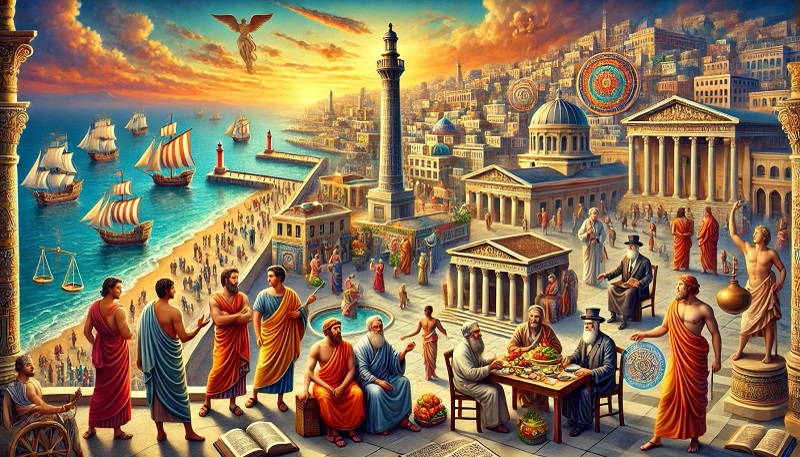Early Connections Between Greek, Egyptian, Jewish, Christian, and Indian Traditions in Western History
Beezone, Ed Reither, and ChatGPT
SUMMARY
The essay explores the rich interplay of Greek, Egyptian, Jewish, Christian, and Indian traditions, focusing on their interconnected influence on early Western civilization. Alexandria, founded by Alexander the Great, served as a hub for cultural and intellectual exchange, where Greek philosophers, Jewish scholars, and Indian sages contributed to a shared heritage. The Septuagint, a Greek translation of the Hebrew Bible, facilitated the integration of Jewish thought into Hellenistic culture and later Christian theology. Indian philosophies, admired by Greek thinkers like Pythagoras and Apollonius of Tyana, introduced concepts of reincarnation and cosmic cycles, influencing Greek and Hellenistic ideas. Mythological and religious parallels, such as shared archetypes and spiritual practices, reveal deep connections among these cultures. The essay highlights Alexandria’s role as a center of synthesis, demonstrating how these interactions shaped the intellectual and spiritual foundations of the Western world.

 he interplay of cultural, philosophical, and religious ideas among Greek, Egyptian, Jewish, Christian, and Indian traditions represents a profound chapter in the history of Western civilization. These interactions highlight the remarkable interconnectedness of ancient societies, with Alexandria serving as a pivotal crossroads of commerce, scholarship, and spiritual inquiry.
he interplay of cultural, philosophical, and religious ideas among Greek, Egyptian, Jewish, Christian, and Indian traditions represents a profound chapter in the history of Western civilization. These interactions highlight the remarkable interconnectedness of ancient societies, with Alexandria serving as a pivotal crossroads of commerce, scholarship, and spiritual inquiry.
The Role of Alexandria: A Crossroads of Civilizations
Founded by Alexander the Great in 331 BCE, Alexandria became a hub for intellectual and cultural exchange. Under the Ptolemies, the city flourished as a center of commerce, housing the renowned Alexandrian Library and Museum. These institutions attracted scholars from around the Mediterranean and beyond, fostering an environment of synthesis between diverse traditions.
Alexandria was home to a thriving Jewish population that contributed significantly to the city’s cultural fabric. Initially brought as captives under Ptolemy I, the Jewish community expanded through voluntary migration, eventually producing the Septuagint, a Greek translation of the Hebrew Bible. This translation not only facilitated Jewish participation in Hellenistic culture but also laid the groundwork for later Christian theology.
Greek Engagement with Jewish and Egyptian Thought
Greek philosophers, intrigued by the moral and spiritual traditions of the Jews, described them as a “nation of philosophers.” Early thinkers such as Theophrastus and Megasthenes noted similarities between Jewish monotheism and Greek philosophical inquiry. This fascination with Jewish ethics and theology led to their integration into Hellenistic intellectual traditions.
Similarly, Egypt’s ancient wisdom captured the imagination of Greek thinkers like Pythagoras and Herodotus, who saw Egyptian cosmology, mathematics, and religious practices as a source of profound insight. These exchanges were not merely observational but deeply transformative, influencing Greek philosophy, including its metaphysical and ethical dimensions.
Indian Influence on Greek and Egyptian Thought
The influence of Indian philosophy and science on Greek thought is a critical yet often overlooked aspect of this interconnected history. Strabo, Philostratus, and others recorded accounts of Greek philosophers traveling to India to study its profound traditions in astronomy, natural philosophy, and morality. Indian sages, including the Brahmans, were renowned for their knowledge and ethical teachings, inspiring figures like Pythagoras and Democritus.
Philostratus’ Life of Apollonius details the travels of Apollonius of Tyana to India, where he engaged with Hindu sages and absorbed their teachings on reincarnation, cosmic justice, and divine virtue. Apollonius’ writings on astrology and cultic practices reflect these Indian influences, underscoring the bidirectional flow of ideas between East and West.
The blending of Greek and Indian traditions also extended to mythology and cosmology. The Hindu concept of the four ages, or Yugas, closely resembles the Greek and Roman ages of gold, silver, bronze, and iron, illustrating shared archetypes in their understanding of time and human development.
Religious and Philosophical Synthesis
The interaction between these traditions created a fertile ground for religious and philosophical synthesis. Hellenistic Jews like Philo of Alexandria harmonized Jewish theology with Greek philosophy, interpreting the Hebrew scriptures through the lens of Platonic and Stoic ideas. This synthesis influenced early Christian theology, which adopted the Septuagint and incorporated concepts of divine order and moral law.
Indian philosophies, with their emphasis on cosmic cycles and spiritual discipline, resonated with Greek and Hellenistic ideas, further enriching the intellectual discourse. Indian sages’ teachings on the soul and its immortality paralleled Pythagorean and Platonic thought, reinforcing commonalities in their spiritual frameworks.
Mythological Parallels and Shared Symbolism
The mythologies of these civilizations reveal striking affinities. Lieutenant Francis Wilford observed that the Hindu Puranas bear a remarkable resemblance to the mythologies of the Greeks and Romans, suggesting shared narrative structures and archetypal themes. For instance, the allegories of the Nile in Egyptian lore find echoes in Hindu and Greek myths, revealing ancient cultural connections.
The symbolic practices of these cultures also reveal affinities. For example, the Egyptian goddess Isis shares attributes with the Hindu goddess Devi, and pilgrimage traditions in both cultures reflect shared spiritual aspirations.
Legacy of Cross-Cultural Interactions
These interconnected traditions laid the foundation for Western civilization’s intellectual and spiritual heritage. Alexandria, as a microcosm of this synthesis, became a beacon of learning and cultural exchange. Its diverse population of Greeks, Jews, Egyptians, and visiting Indian sages exemplified the possibility of mutual enrichment through dialogue.
The legacy of these connections persists in the enduring influence of Greek philosophy, Jewish ethics, Christian theology, and Indian spirituality on global thought. By bridging diverse traditions, these ancient cultures contributed to a shared heritage that continues to shape our understanding of morality, cosmology, and human purpose.
Sources:
Grammar of Septuagint Greek, F.C. Conybeare and St. George Stock, Hendrickson Publishers, 1995
Greek Knowledge of Jews Up to Hecataeus aof Abdera, Emilio Gabba, Professor of Roman History, University of Pavia, Italy, The Center for Hermeneutical Stuides, Colloquy 40, Graduate Theological Seminary, Berkeley, CA, , 1981.
The Greek Experience of India, Richard Stoneman, Princeton University Press, 2020.

